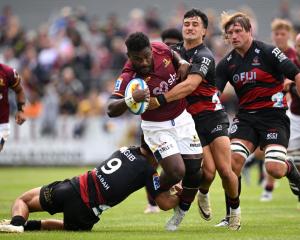
Otago rugby boss Richard Reid admits public confidence in Otago rugby was probably lost a while ago.
But Reid, who took the job as chief executive of the Otago Rugby Football Union in October last year, says it can be turned around, and perception was not always reality.
"We were on a D minus. I think we are now on a C plus," he said.
He said retention of players was made on judgement calls and the fact the union reduced its wage bill by $500,000 over the past 12 months, offering nine fewer contracts to players.
That might reduce further still from the current 26.
The union had to reduce costs as it incurred a $1.5 million loss last year, with $900,00 of that in cash.
Selections were always subjective, and the union was recruiting players.
But negotiations took time and had to be done in confidence as it was a competitive market, and other unions might be tipped off about players moving.
He was confident of announcing player signings soon.
As for the confidence of the Otago rugby public, that could only be gained by sides winning again.
"That confidence was lost quite some time ago. The Highlanders have had a couple of struggling seasons and Otago have not been winning," he said.
He admits Southland probably has done a better job than Otago in the past few years.
People not watching was not unique to Otago.
Crowds were down right across the country, but just because people did not turn up did not mean they were not interested.
"There is the perception that the stadium is empty so the union is knackered. But that is far from the truth. It is not all about the First XV. Rightly or wrongly, people think it is."
Reid said the union had overspent and had to live within its means.
The future of New Zealand rugby was going to be based around franchises and it was sometimes difficult for people to accept the likes of Otago and Southland would not be what they had been for the past 100 years.
When the Super 14 is changed in 2010, and whatever form it takes, the Highlanders will become much more important.
"Whether we agree with that or not, that is what is going to be happening."
Reid said he had halted a review of Otago rugby, which former coach Wayne Graham was going to be part of, until the future of the Air New Zealand Cup was decided.
Whenever a team won, it was all down to the players but when the team lost the coaches always got the blame, he said.
He wanted to get the union up to a B plus performance, with plenty of A grade performances and no grades D or below.
He said if people wanted to discuss issues he could always be contacted.
"It would be naive of me when I took this job on to think there would not be some public discontent. I came into this job with my eyes wide open and it is not going to be fixed overnight."
He said in researching the job he found Otago really only won something every 15 years but people thought success was a lot more regular.
Otago coach Steve Martin said no-one had a right to the jersey, and if players - even experienced players - were not performing there had to be changes.
Martin had used outside help, saying he often sought the advice of former All Blacks assistant coach and Otago coach Tony Gilbert.
Country players had been viewed at least three times.
He agreed there was too much analysis in the game but Otago had a simple game plan with one or two variations.
There was a misconception players lived and breathed rugby, but the Otago side only had two training runs a week plus a captain's run.
There were also a couple of conditioning sessions but the players were not overloaded.
Discipline had been all right, he felt, apart from early on in the game against Tasman, when lock Ross Kennedy was sin-binned.
He admitted the side had yet to play to its potential, but plenty of other teams were struggling.
The side had two games to go, against Waikato and Wellington, and would be giving its all to qualify for the quarterfinals.












